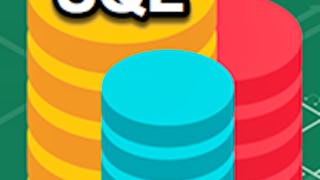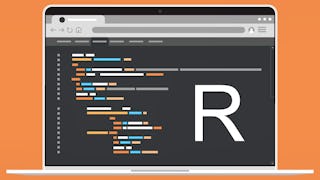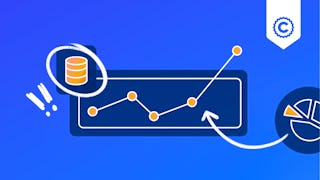Much of the world's data resides in databases. SQL (or Structured Query Language) is a powerful language which is used for communicating with and extracting data from databases. A working knowledge of databases and SQL is a must if you want to become a data scientist.

Enjoy unlimited growth with a year of Coursera Plus for $199 (regularly $399). Save now.

SQL for Data Science with R
This course is part of multiple programs.

Instructor: Rav Ahuja
27,182 already enrolled
Included with
(184 reviews)
Recommended experience
What you'll learn
Create and access a database instance on the cloud
Compose and execute basic SQL statements - SELECT, INSERT, UPDATE, DELETE, CREATE, DROP
Construct SQL statements to filter, sort, group results, use built-in functions, compose nested queries, access multiple tables
Analyze data from Jupyter using R and SQL by combining SQL and R skills to query real-world datasets
Skills you'll gain
Details to know

Add to your LinkedIn profile
See how employees at top companies are mastering in-demand skills

Build your subject-matter expertise
- Learn new concepts from industry experts
- Gain a foundational understanding of a subject or tool
- Develop job-relevant skills with hands-on projects
- Earn a shareable career certificate

There are 6 modules in this course
Structured Query Language, or SQL, provides a standard language for selecting and manipulating data in a relational database. Understanding SQL is a foundational skill that you must have when applying data science principles in R because SQL is the key to helping you unlock insights about the information stored deep inside relational databases. In this module, you will learn some basic SQL statements and practice them hands-on on a live database.
What's included
5 videos2 readings2 assignments3 app items2 plugins
In this module, you will explore the fundamental concepts behind databases, tables, and the relationships between them. You will then create an instance of a database, discover SQL statements that allow you to create and manipulate tables, and then practice them on your own live database.
What's included
6 videos3 readings2 assignments3 app items2 plugins
In this module, you will learn how to use string patterns and ranges to search data and how to sort and group data in result sets. You will also practice composing nested queries and execute select statements to access data from multiple tables.
What's included
7 videos4 readings4 assignments4 app items5 plugins
In this module, you will learn the benefits of using R to connect to relational databases and how to persist R database objects in files. You’ll also learn some of the similarities between R data frames and relational databases, including how data types compare and when you must convert from one type to another to improve the effectiveness of your data analysis. Finally, you’ll learn different methods for connecting to a database from R.
What's included
10 videos3 readings4 assignments5 app items5 plugins
In this module, you will learn the full process of accessing and querying databases using R. You’ll learn how to create the logical and physical model of the database and then implement the model by creating the physical database objects and loading them with data. Finally, you’ll examine an example of accessing and querying the database.
What's included
6 videos2 readings2 assignments2 app items2 plugins
In this assignment, you will be working with multiple real-world datasets for the Canadian Crop Data and Exchange Rates. You will be asked questions that will help you understand the data just as you would in the real world. You will be assessed on the correctness of your SQL queries and results.
What's included
1 reading1 assignment1 peer review5 app items2 plugins
Earn a career certificate
Add this credential to your LinkedIn profile, resume, or CV. Share it on social media and in your performance review.
Explore more from Data Analysis
 Status: Free Trial
Status: Free Trial Status: Free Trial
Status: Free Trial Status: Free Trial
Status: Free Trial
Why people choose Coursera for their career




Learner reviews
184 reviews
- 5 stars
64.67%
- 4 stars
19.02%
- 3 stars
9.23%
- 2 stars
2.17%
- 1 star
4.89%
Showing 3 of 184
Reviewed on Feb 12, 2025
The content and pacing were excellent. I came into the course with plenty of PL/SQL experience, and left feeling like I had a strong foundation with how SQL works in R.
Reviewed on Apr 11, 2023
it was great i learned a lot and also was useful for me to understand a lot in data science field ...Many Thanks
Reviewed on Oct 28, 2022
Well designed course with exposure to ODBC and JDBC...

Open new doors with Coursera Plus
Unlimited access to 10,000+ world-class courses, hands-on projects, and job-ready certificate programs - all included in your subscription
Advance your career with an online degree
Earn a degree from world-class universities - 100% online
Join over 3,400 global companies that choose Coursera for Business
Upskill your employees to excel in the digital economy
Frequently asked questions
To access the course materials, assignments and to earn a Certificate, you will need to purchase the Certificate experience when you enroll in a course. You can try a Free Trial instead, or apply for Financial Aid. The course may offer 'Full Course, No Certificate' instead. This option lets you see all course materials, submit required assessments, and get a final grade. This also means that you will not be able to purchase a Certificate experience.
When you enroll in the course, you get access to all of the courses in the Certificate, and you earn a certificate when you complete the work. Your electronic Certificate will be added to your Accomplishments page - from there, you can print your Certificate or add it to your LinkedIn profile.
More questions
Financial aid available,
¹ Some assignments in this course are AI-graded. For these assignments, your data will be used in accordance with Coursera's Privacy Notice.


